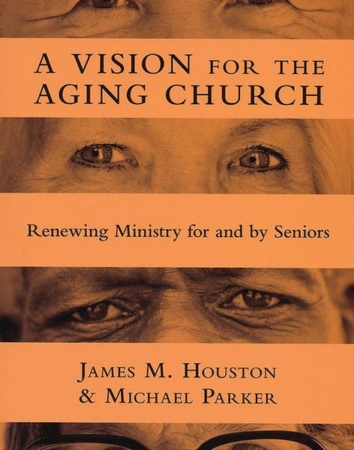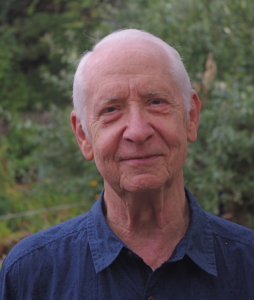A Vision for the Aging Church; Renewing Ministry for and by Seniors by James M. Houston and Michael Parker
Book Review by Barrie McMaster
 Two innovators have published a great book about seniors, seniors in church settings, and seniors as victims of a productivity-oriented culture. The book came out almost five years ago, and it’s more relevant than ever today.
Two innovators have published a great book about seniors, seniors in church settings, and seniors as victims of a productivity-oriented culture. The book came out almost five years ago, and it’s more relevant than ever today.
It tackles topics like seniors being out of touch, seniors’ susceptibility to depression, youngers’ loss of olders’ wisdom and values, churches’ loss of ministry resource people, and what can be done to turn things around. The authors challenge ageism at its broadest, but perhaps take their most direct aim at seniors, themselves! As the baby-boom generation creeps more and more into Western consciousness, it’s time we listened up.
Consider people moving into the last season of life, say the authors. In most societies, they are respected, loved, listened to, appreciated. Seniors can bless those around them. They can bring a unique perspective to current issues, because they have, indeed, lived longer. Most seniors by this season of their lives have wisdom to share, passion to energize and understanding to articulate values that younger generations need to hear. Most seniors demonstrate committed love, strength and encouragement, and most societies treasure these qualities. But our society? Not so much, say Houston and Parker. And that is the nub of this book.
In a biblical context, rabbinical writings call the aged a ”source of wisdom”. The Ten Commandments include God’s instruction to honour father and mother. In traditional societies the world over, elders (the authors’ preferred word for old folks) are consulted and heeded as heads of the family or clan, beyond question as legitimate leaders who need no formal office or political clout.
In a Christian covenant context, the early Puritans considered the worth of “living well to die well”. The best prepared, say the authors, “were the most zestful, …an abundant source of spiritual blessing to others, … an emotional summation that God is doing well with our soul.”
But not here in North America, not now! That’s just not in our culture, say the authors. And this modern culture proves comedian Rodney Dangerfield’s complaint: “I don’t get no respect!” The culture ensnares seniors, church people, and North Americans as a whole in a web of six “false myths”:
- “To be old is to be sick.”
- “You can’t teach an old dog new tricks.”
- “The horse is out of the barn.” (i.e., it’s too late to improve anything.)
- “The secret to age successfully is to choose your parents wisely.” (i.e., you have no choices.)
- “Older peoples’ mental or physical capacity is reduced or inadequate.”
- “The elderly don’t pull their own weight, anyway.”
The sad part is that many elders believe those myths, and psychologically, perhaps even spiritually, they lose hope. If seniors believe they are irrelevant and keep their silence, their families miss out on love, transference of values and caring. Houston and Parker argue those values form part of the fabric of a healthy society and a healthy family. Most churches also put seniors out to pasture, regarding them as only fit to be ministered to, rather than being resources to provide ministry. Many church leaders, along with their secular society, give seniors little regard, saying they are past their prime and are out of touch. So aged people live below their potential and cheat themselves and their loved ones out of the fruit that God had designed for this season of life – a new level of joy, fulfillment and involvement with others.
But what about Alzheimers and dementia, or physically debilitating conditions? Houston and Parker argue that, even in incapacity, elders’ contributions to the people whose lives they touch is immense. Cancer, dementia, and various conditions of pain do come with periods of clarity or pain reduction that permit the sufferer to talk, allow thought, and reflect on what is happening to those they care for. Even when the burden of caring becomes heavy as the condition worsens, the love and the “moments” can be precious within the family. Just listen to the stories at funerals! Houston and Parker say, “It’s not what we suffer, but how we suffer,” and there is still meaning in the ill senior’s relationships, caring and even their ability to give of themselves.
The authors do not mention funerals, but it is common at services to hear loved ones reflect on the life of the deceased. It’s the love, the good times, the funny stories – sometimes based on exchanges on a death bed – that provide the blessing to those who survive. Houston and Parker speak frequently of a holistic view of an individual’s life, in contrast to a person’s productivity or usefulness in a culture that clings crisply to rationality, emotion-free analysis and logic. Holism touches the web of love, wisdom, advice, caring and meaning that family members and friends share. Each person, made in God’s image, leaves a lifetime legacy, say the authors, and if we do not recognize the fact, we are all the poorer.
And where are the seniors on this issue? Houston and Parker throw down a gauntlet: “Mature seniors are key to challenging the depersonalization of our culture.” They argue, for example, that current disenchantment with “the rationalism of modernity” opens opportunities. This is a time, with neuroscience advancing, that Christians need to “explore more deeply the whole emotional context of living personally — as Christians.”
Where are churches in this? Apparently little different from the general culture. The authors say, “Biblically, we can never view other humans from a strictly utilitarian evaluation. But that is how we often dismiss seniors — as no use to the church….” They add, “We contend that organized Christianity has a moral obligation to confront the common thinking that older persons are more of a burden than a gift….”
Seniors, having lived longer, have seen more consequences of people making wrong choices and going in wrong directions. Houston and Parker say we need to repent – repent from our culture of chasing self-fulfillment and consumerism, and change identity as stewards of our planet’s limited resources to a culture concerned with the well-being of future generations. They suggest, “We begin by sharing with our grandchildren how we had to earn and save money, never spending beyond our means. We teach them loyalty to personal commitments of job and community, as well as to spouse and family.”
There are glimmers of hope. Some individual churches do utilize and value seniors in their ministries. The authors have found – and Parker put into practice in Alabama – that Bible study groups, and inter-generational sharing in a church context, can be powerful in shifting cultures away from ageism. Some churches are also bringing themselves, medical and caretaking groups together for a mutual and more seamless response to difficult health developments in seniors’ lives when needed.
Houston and Parker have found that, even in North America, there exist some groups of ministries dedicated to empowering their seniors. These associations share the conviction that it’s important to challenge seniors to “ministry-inspired leadership”. And they support seniors’ individual ministries to others within the church.
The book has an excellent chapter on seniors’ depression, and contains many appendices that provide practical help on parent care readiness, government help, and many facets of support for both churches and senior ministers to use.
Houston and Parker say, “At the core of our late life ministry, whatever our physical state should be, the church should be in the position of reminding Christians that ‘Jesus Christ is the same yesterday and today and forever’.”
They say, “It is the spiritual responsibility of Christian seniors to settle, alone with God, the immensely important matter of their late life calling.” Those seniors can leave “an eternal legacy, even if they are a ‘burden’ for a season.”
The hammer blow: “In the final season of life, [seniors] are in a position to have the greatest influence, if we don’t grow weary.”

Barrie McMaster
Barrie McMaster is an award-winning news reporter and radio broadcast executive best known for his work in the B.C. Lower Mainland. He reported on many major events in and around Greater Vancouver and was a familiar voice on CKNW newscasts. He helped to put a new Fraser Valley radio station, STAR-FM on-air as its program director. He holds an M.A. in Political Science, and shaped and taught the first two-year broadcast journalism program at the B.C. Institute of Technology.
He is active in volunteer work in the Valley, having served as president of Chilliwack’s Rotary club, a director on the Ann Davis Transition Society board, Chilliwack Social Planning Council, Chilliwack Symphony Society and many political campaign committees. He served as B.C. Correspondent for the Mennonite Brethren Herald magazine and continues as a freelance writer.
His passions include his local church, where he has served as an elder for many years. He and wife Jan have travelled frequently to West Africa as members of instructional teams. At home, they often serve together on community projects and passionately love and enjoy family and grandchildren. Barrie plays the cello, loves travelling, and enjoys time with friends.
He likes to share the fact that aging is far better than it’s cracked up to be. “It can be a wonderful time of life.”






